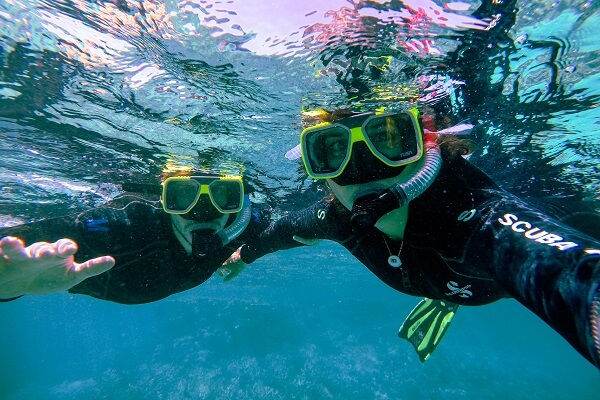
Do you need to wear a stinger suit on the Great Barrier Reef?
Written by: Cameron Ward
Published: 11/25/2022
Reading time: 3 mins
The Great Barrier Reef is one of the seven wonders of the world. With coral, marine life and clear water, it makes sense why travellers from across the world make the journey to the Great Barrier Reef.
While you want to swim, dive or snorkel in the Great Barrier Reef, you must be wondering if you need to wear a stinger suit. It is recommended to wear a stinger suit as a precaution for any water activities in the Great Barrier Reef. Even if the chances of being stung is low, we wouldn’t want anything life-threatening to be happening to you! Best you grab a stinger suit and explore the Great Barrier Reef waters safely.
Stinger Suit
A stinger suit was designed to protect swimmers from being stung by two types of jellyfish. The suit is a full-body suit which has three different layers, with the outer layer using a slippery quality fibre to stop a jellyfish tentacle going into the suit. Not only will these suits protect you from stingers, but they will also protect you from the harsh Australian sun. You can buy these suits, or you can hire one while on one of the tours for the Great Barrier Reef.
Jellyfish
There are two types of jellyfish with stingers in the Great Barrier Reef, the irukandji jellyfish and the box jellyfish. The irukandji are small jellyfish, they’re about two centimetres big! So they can be a lot harder to spot in the waters. Irukandji almost look like an ice cube with four tentacles on the bottom corners. Box jellyfish are larger so they can be easier to spot. They look almost like a plastic bag in water. Both of these jellyfish species are extremely venomous. The box jellyfish is the most dangerous, and is considered one of the most dangerous marine animals in the world.
When is Stinger Season?
Stinger season is from November to May. During these months is where it is more likely for jellyfish stings to happen due to a higher number of jellyfish in the waters. Just because these months are commonly referred to as stinger season, it doesn’t mean jellyfish stings can’t happen all year round. If you think you have been stung by a jellyfish, let a lifeguard or tour guide know as soon as possible so they can apply vinegar and get you more medical attention.
Don’t let any of this startle you though. If you wear a stinger suit and keep watch, you should be safe from those nasty stings. Be safe and enjoy the Great Barrier Reef!








